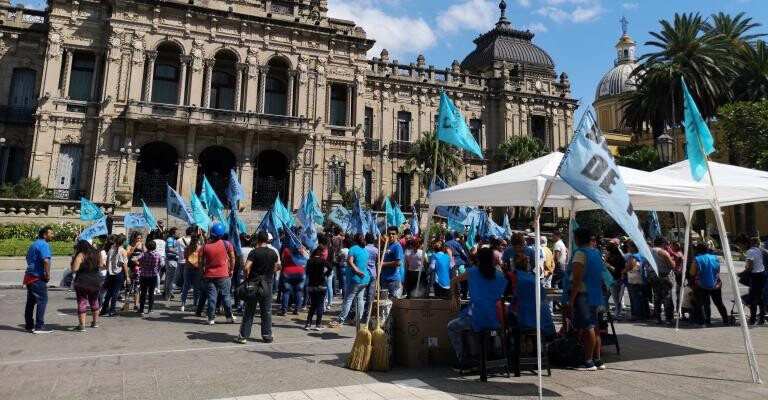
BUENOS AIRES, Argentina – A heated controversy has erupted in Argentina after the State Intelligence Secretariat (SIDE), the country's national intelligence agency, approved a "National Intelligence Plan" that could permit the collection of information on journalists, economists, academics, and other government critics. This development was reported by Hugo Alconada Mon, an investigative journalist, in the prominent local daily 'La Nación,' signaling escalating tensions between the Javier Milei administration and the press.
Vague Regulations Fuel Fears of "Government Critic" Surveillance
According to Alconada Mon's report, this 170-page document, formulated under the direction of SIDE chief Sergio Neiffert by late 2024, contains "generalizations, gray areas, and ambiguities." This has raised concerns that it could target anyone who might "erode" public trust in security authorities or "cause a loss of confidence" in government economic policies. This effectively means that any individual critical of the government could be considered a potential target for surveillance.
The plan has also been criticized for failing to clearly distinguish between foreign intelligence threats and legitimate critics, such as journalists and experts. Of particular concern is the potential for targeting members of the press and subject matter experts who might "manipulate" public opinion or "spread disinformation" during election periods, drawing strong criticism that it could undermine freedom of expression and the foundations of democracy.
While President Milei's press office immediately denied these accusations, hours after the report emerged, President Milei posted on his X (formerly Twitter) account that "the press (90%) is the creator of the biggest fake news in human history," echoing President Donald Trump's anti-press sentiment. These direct statements from the president have further intensified suspicions regarding the intelligence plan's content.
Alconada Mon stated that after his report, unidentified hackers attempted to breach his WhatsApp account 10 times and his X account once, suggesting that this controversy is not merely a policy discussion but is leading to actual cyber threats.
A Historical Repeat of Press Suppression?
This controversy clearly demonstrates the escalating tensions between the Milei administration and its critics in the media, raising serious concerns about press freedom and the government's surveillance capabilities. Last year, President Milei had already announced plans to reorganize Argentina's state news agency, Télam, into an advertising agency, which triggered widespread protests by journalists. This was interpreted as an attempt to undermine the independence of state media and strengthen government control, and, combined with the current intelligence plan controversy, is seen as a prelude to press suppression.
This intelligence plan emerges amidst deepening political polarization in Argentina due to economic difficulties, and as President Milei wages a broad campaign against the Argentine media establishment. The libertarian president has increasingly and overtly attacked journalists, using slogans like "people don't hate journalists enough," and members of his cabinet have followed suit with similar remarks.
Luis Caputo, the Minister of Economy, recently claimed that journalism is a "disappearing profession," and Santiago Caputo, a presidential advisor, has been accused of threatening photographers covering political events. This anti-press rhetoric also coincides with a dramatic increase in physical attacks on journalists. Recently, reporters covering protests by pensioners were hit with tear gas and threatened by unidentified attackers. This indicates a grave situation where the Milei government's hostility towards critical media is extending beyond mere verbal attacks to actual violence.
From "Honeymoon" to "Hostility" with the Media
Before taking office, President Milei built his political career through a "honeymoon" relationship with the Argentine media. He frequently appeared on TV and radio programs, skillfully leveraging media exposure to secure a parliamentary seat and later to enter the presidential palace. However, since his inauguration, President Milei has severely restricted media access, allowing interviews only under strictly controlled conditions within the presidential palace. This suggests a complete shift from a cooperative relationship with the media to a hostile one.
International Concerns and Declining Press Freedom Index
The Argentine Journalism Forum has warned about "the proliferation of attacks on journalists fostered by the country's highest authority," noting a 53% increase in attacks on the press in 2024 compared to the previous year, with digital harassment accounting for nearly half of all incidents. This is objective data indicating a rapidly deteriorating media environment in Argentina.
Reporters Without Borders (RSF), an international non-governmental organization, issued a harsh assessment of Argentina in its latest report. The report explicitly stated that "in Argentina, President Javier Milei has stigmatized journalists, dismantled public media outlets, and used state advertising as a political weapon."
Since President Milei took office in December 2023, Argentina has dropped 47 places to 87th out of 180 countries in RSF's annual World Press Freedom Index. This indicates that the Milei government's media policies are causing serious international concern and reinforce the perception that Argentina's democracy and freedom of expression are under threat.
The controversy surrounding the Argentine government's approval of the national intelligence plan is seen as a serious challenge not only to the expansion of intelligence agency powers but also to the fundamental principles of press freedom and democracy. In a country experiencing economic difficulties, the attempt to restrict the critical and oversight functions of the media could undermine social transparency and lead to democratic regression, warranting continued international attention and criticism. The Argentine government must uphold the fundamental values of democracy by guaranteeing press freedom and accepting critical voices.
[Copyright (c) Global Economic Times. All Rights Reserved.]



























